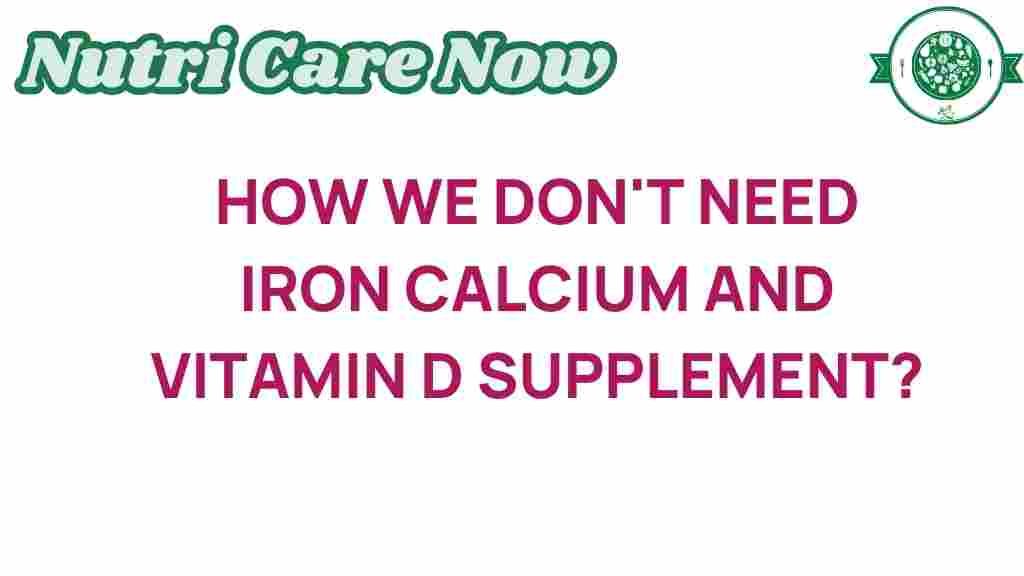The Surprising Truth: Do We Really Need Iron, Calcium, and Vitamin D Supplements?
In today’s health-conscious society, the conversation around nutrition often gravitates towards the necessity of supplements. Among the most commonly discussed are iron, calcium, and vitamin D. But do we really need these supplements for our health? This article delves into the facts and myths surrounding these essential nutrients, helping you understand their roles, benefits, and the implications of supplementation.
Understanding Our Dietary Needs
Before we dive into the specifics of iron, calcium, and vitamin D, it’s crucial to understand our dietary needs. Each individual’s requirements can differ based on several factors, including age, gender, lifestyle, and health status. Here’s a breakdown of how these nutrients contribute to our overall wellness:
- Iron: Essential for the production of hemoglobin, which carries oxygen in the blood.
- Calcium: Vital for strong bones and teeth, as well as muscle function and nerve signaling.
- Vitamin D: Crucial for calcium absorption and maintaining bone health, as well as supporting the immune system.
The Role of Iron in Our Health
Iron is a critical component of our nutrition, especially for women and children. It supports various bodily functions, but its deficiency can lead to anemia, fatigue, and impaired cognitive function.
Sources of Iron
Iron is available in two forms: heme and non-heme. Heme iron is found in animal products, while non-heme iron is present in plant foods. Here are some excellent dietary sources:
- Red meat
- Poultry
- Fish
- Beans and lentils
- Spinach and other leafy greens
- Fortified cereals
Understanding Calcium’s Importance
Calcium is often touted for its role in building strong bones, but its benefits extend far beyond that. It also plays a role in muscle contraction, blood clotting, and nerve transmission.
Calcium-Rich Foods
To meet your calcium needs, consider including the following foods in your diet:
- Dairy products (milk, yogurt, cheese)
- Leafy greens (kale, broccoli)
- Fortified plant-based milk
- Tofu
- Fish with bones (like sardines)
The Essential Role of Vitamin D
Vitamin D, often referred to as the “sunshine vitamin,” is essential for calcium absorption and bone health. It also supports immune function and has been linked to mood regulation.
How to Get Vitamin D
The primary source of vitamin D is sunlight; however, it can also be obtained through certain foods:
- Fatty fish (salmon, mackerel)
- Cod liver oil
- Egg yolks
- Fortified foods (milk, orange juice)
Do We Need Supplements?
While these nutrients are crucial for our health, the necessity of supplements depends largely on individual dietary intake and specific health conditions. Here’s a closer look:
When Supplements Might Be Necessary
Some individuals may find it challenging to meet their dietary needs through food alone. Here are scenarios where supplements might be beneficial:
- Iron: Women who are pregnant, menstruating heavily, or vegetarians may need iron supplements.
- Calcium: Older adults or those with lactose intolerance may require calcium supplements to maintain bone health.
- Vitamin D: People living in areas with limited sunlight exposure or those with certain medical conditions may need vitamin D supplements.
Potential Risks of Over-Supplementation
While supplements can be beneficial, over-supplementation can lead to adverse health effects:
- Iron: Excessive iron can cause gastrointestinal issues and toxicity.
- Calcium: High calcium intake may increase the risk of kidney stones and cardiovascular problems.
- Vitamin D: Too much vitamin D can lead to hypercalcemia, causing nausea and confusion.
Addressing Common Myths
There are numerous myths surrounding iron, calcium, and vitamin D supplements. Let’s dispel some of them:
Myth 1: Everyone Needs Supplements
While supplements can be helpful, most people can meet their nutrient needs through a balanced diet. It’s essential to assess your diet before turning to supplements.
Myth 2: More is Always Better
Many believe that taking higher doses of supplements will provide better health benefits. In reality, this can lead to toxicity and health issues.
Myth 3: Supplements Can Replace a Healthy Diet
Supplements should complement, not replace, a healthy diet. Whole foods provide a range of nutrients that supplements cannot mimic.
Step-by-Step Process to Assess Your Supplement Needs
Determining whether you need iron, calcium, or vitamin D supplements involves a systematic approach:
- Evaluate Your Diet: Keep a food diary for a week. Assess if you are getting adequate amounts of iron, calcium, and vitamin D from your meals.
- Consult a Healthcare Professional: Speak with a doctor or dietitian who can evaluate your dietary habits and health status.
- Get Tested: Blood tests can determine deficiencies in iron, vitamin D, and calcium levels.
- Consider Lifestyle Factors: Assess your exposure to sunlight, physical activity levels, and any health conditions that may impact nutrient absorption.
- Make Informed Decisions: Based on your evaluation, decide if supplements are necessary and consult your healthcare provider for recommendations.
Troubleshooting Tips for Supplementation
If you decide to take supplements, here are some tips to ensure they are effective and safe:
- Choose Quality Products: Look for reputable brands that undergo third-party testing.
- Monitor Your Intake: Keep track of what you take to avoid excessive consumption.
- Be Aware of Interactions: Some supplements can interact with medications. Always consult your doctor.
- Adjust as Needed: Regularly reassess your dietary needs and adjust your supplementation accordingly.
Conclusion
The discussion around iron, calcium, and vitamin D supplements is nuanced. While these nutrients are essential for our health, the need for supplements varies from person to person. It’s crucial to focus on a balanced diet rich in these nutrients, consult healthcare professionals, and consider your unique dietary needs. By doing so, you can make informed decisions that promote your overall wellness.
For more information on nutritional needs and supplements, check out this resource. If you’re looking for reliable dietary recommendations, you might also find this guide helpful.
This article is in the category Supplements and created by NutriCareNow Team
